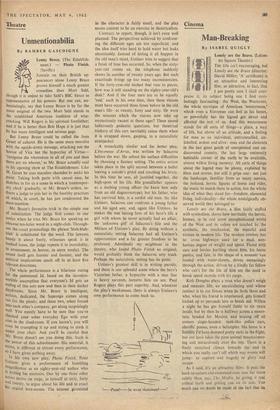Theatre
Unnientionabilia
By BAMBER GASCOIGNE Lenny Bruce. (The Establish- ment.) — Photo Finish. (Saville.) JUDGED on their British ap- pearances alone Lenny Bruce proves himself a much greater representative of his powers. But one can, un- hesitatingly, say that Lenny Bruce is by far the more original of the two. Mort Sahl stands in the established American tradition of wise- cracking. Will Rogers is his spiritual forefather; and if he is better than Bob Hope it is just that he has more intelligent and serious gags.
But Lenny Bruce could be called the Jean Genet of cabaret. He is the same stern moralist with the upside-down message, attacking not the horror of Vice but the hypocrisy of Virtue— `recognise the whoredom in all of you and then there are no whores,' as Mr. Bruce actually said in his opening show at The Establishment. Like M. Genet he uses macabre charades to make his Point. Taking both parts with casual ease, he sketches in for us a scene in which a 'contempor- ary chick' gradually, at Mr. Bruce's orders, in- duces a judge to join her in the feeelthy practices 0f which, in court, he has just condemned the mere mention.
Mr. Bruce's favourite trick is the simple one of substitution. The judge first comes to our notice when he tries Mr. Bruce for speaking an obscene ten-letter word in a night-club. Through- out the court proceedings the phrase `blah-blah- blah' is substituted for the word. The lawyers bandy it about freely, witnesses speak it in hushed tones, the judge repeats it in incredulity, in amazement, in horror, in stern verdict. The sound itself gets funnier and funnier, and the satirical implications spark off in at least five relevant directions.
The whole performance is a hilarious outing for the communal Id, based on the incontro- vertible assumption that everyone's Id gets an outing of this sort now and then in their darker daydreams. Since Mr. Bruce is intelligent, serious, dedicated, the Superego comes along too for the picnic; and these two, when forced into each other's company, get along surprisingly well. You merely have to be sure that you've checked your sober everyday Ego with your Coat in the cloakroom. If you haven't, you will soon be crumpling it up and trying to stash it under your chair. And you'll be careful that Mr. Bruce doesn't see you doing this. Such is the power of this schoolmaster. His material, it seems, is different at almost every performance, so I have given nothing away. In his own new play, Photo Finish, Peter Ustinov gives a performance of bumbling magnificence as an eighty-year-old author who is writing his memoirs. One by one three other actors arrive on stage, as himself at sixty, forty d twenty, to argue about his life and to enact his crucial love-scenes. The interest generated in the character is fairly small, and the play seems content to be an exercise in theatricalism.
Contrary to report, though, it isn't even well planned. The perspectives achieved by confront- ing the different ages are too superficial, and the idea itself tries hard to hold water but leaks abominably. Instead of letting it all happen in the old man's mind, Ustinov tries to suggest that a freak of time has occurred. So, when the sixty- year-old comes on, the telephone suddenly shows its number of twenty years ago. But such exactitude brings up too many inconsistencies. If the forty-year-old dashed that vase to pieces, how was it still standing on the eighty-year-old's desk? And if the four men arc to be equally 'real,' each in his own time, then these visions must have occurred three times before in the old man's life—at twenty, forty and sixty. Or were the minutes which the visions now take up mysteriously vacant at those ages? These sound ludicrously pedantic questions, but theatrical trickery of this sort inevitably raises them when it is strapped down, gasping, in a naturalistic straitjacket.
A remarkably similar and far better play, L'lnconnue d'Arras, was written by Salacrou before the war. He solved the surface difficulties by choosing a fantasy setting. The entire action takes place in the split second between a bullet leaving a suicide's pistol and reaching his brain. In this time he sees, all jumbled together, the high-spots of his life. His grandfather appears as a dashing young officer (he knew him only from an old daguerreotype), but his father, who has survived him, is a sordid old man. So, like Ustinov, Salacrou can confront a young father and his aged son; and, again like Ustinov, he makes the one lasting love of his hero's life a girl with whom he never actually had an affair, the 'unknown girl' of Salacrou's title and the Miriam of Ustinov's play. By doing without a naturalistic setting Salacrou had all Ustinov's opportunities and a far greater freedom to be profound. Admittedly my neighbour in the theatre, who found Photo Finish so original, would probably think the Salacrou arty trash. Perhaps the naturalistic setting has its point.
Ustinov's greatest skill is in writing parody, and there is one splendid scene where the hero's Victorian father, a hypocrite with a nice line in heavy sarcasm, lectures him on sex. Paul Rogers plays this part superbly. And, whatever the play's weaknesses, there is always Ustinov's own performance to come back to.
'--Psssll—he went thatawayl—'






































 Previous page
Previous page